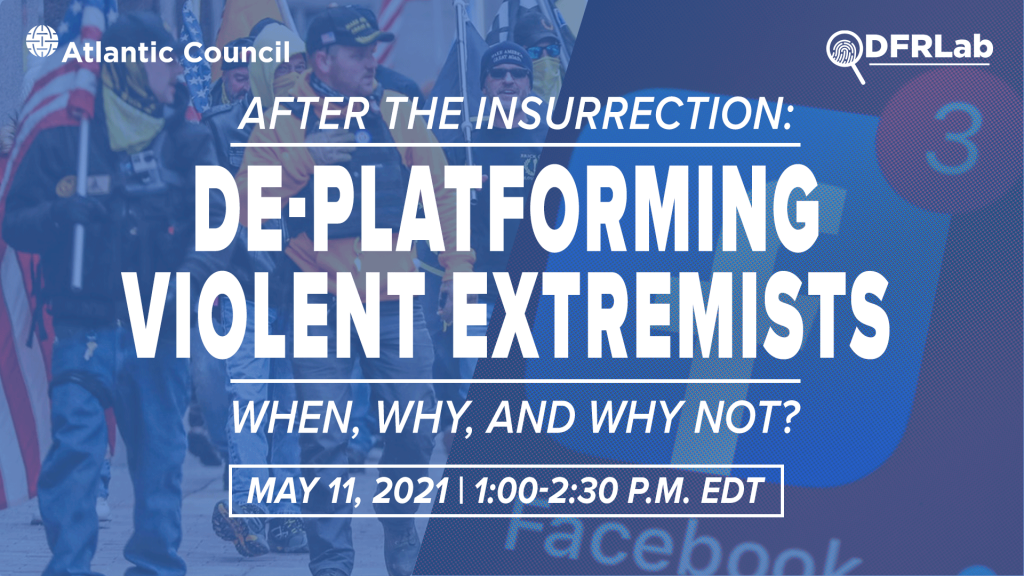
After the Insurrection: De-Platforming Violent Extremists – When, Why, and Why Not
Join us for the public event, After the Insurrection: De-Platforming Violent Extremists – When, Why, and Why Not? on May 11 at 1:00 – 2:30 pm EDT. This conversation will examine the banning, reduction, or restriction of extremist content by social media platforms and other digital service providers. The conversation will focus particularly on the mitigation of online calls for violence before they spur tragic, real-world consequences.
This is the third in the Atlantic Council series “After the Insurrection,” examining how the January 6, 2021 mob attack on the US Capitol is shaping the response to the threat from domestic terrorism by white supremacists and anti-government groups.
Violent extremist content online calling for white supremacism and anti-government violence helped drive mass killings in 2011 at Oslo and Utøya in Norway, in 2015 at the Emanuel African Methodist Episcopal Church in Charleston, in 2018 at the Tree of Life Synagogue in Pittsburgh, and in 2019 at the Al-Noor Mosque in Christchurch, New Zealand. The January 6 insurrection at the US Capitol, supported by violent online propaganda and disinformation, galvanized extremists and empowered offline organizing, pushing conversations about content moderation and intermediary liability to the fore with global implications. Recently, Facebook’s Oversight board upheld the platform’s decision to ban Trump from Facebook, while critiquing the opaque nature of platform decision making, and calling for greater clarity and transparency. As online platforms take measures to limit the proliferation of extremist content, their actions raise important issues related to online expression, the efficacy of moderation, and the co-existence of democratic norms and security in cyberspace.
Expert panelists J.M. Berger, Author and Ph.D. Candidate at Swansea University, Jenny Domino, Associate Legal Adviser for the International Commission of Jurists, Jared Holt, Resident Fellow of the DFRLab, and Emma Llansó, Director of the Free Expression Project at the Center for Democracy & Technology, will explain how platforms define violent extremism, the tools available to major web services to address extremist content, the strengths and the technical limits of different methods, as well as potential risks and unintended consequences of enforcement. They will put these protocols into the context of existing laws and precedents that govern the internet and corporate behavior. The panelists will discuss the ongoing shift in the regulatory landscape, calls for greater governmental intervention, potential roadblocks, and propose practical solutions. Ultimately, society must decide who, or what, ought to be the arbiter and enforcer of whatever rules exist. Emerson Brooking, Senior Fellow at the Digital Forensic Research Lab will be providing opening remarks, and Tom Warrick, Nonresident Senior Fellow at the Atlantic Council, will be giving closing remarks. The discussion will be moderated by Mike Wendling, Editor at the BBC.
This event is hosted by the Atlantic Council’s Digital Forensic Research Lab, in partnership with the Scowcroft Center for Strategy and Security’s Future of DHS Project.
Opening remarks by
Emerson Brooking
Senior Fellow
Digital Forensic Research Lab
Featuring
J.M. Berger
Author, Ph.D. Candidate
Swansea University
Jenny Domino
Associate Legal Adviser
International Commission of Jurists
Jared Holt
Resident Fellow
Digital Forensic Research Lab
Emma Llansó
Director, Free Expression Project
Center for Democracy & Technology
Moderated by
Mike Wendling
Editor
BBC
Closing remarks by
Tom Warrick
Nonresident Senior Fellow
Middle East Programs and the Scowcroft Center for Strategy and Security
Atlantic Council


On Twitter? Follow @DFRLab and @AtlanticCouncil to join the conversation